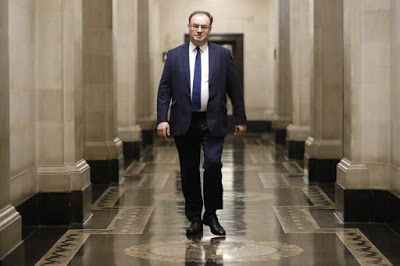Overview: Rising energy prices and yields are helping lift the US dollar and weighing on equities. November WTI has pushed above , while Brent traded above , and natural gas is up for the fourth consecutive session, during which time it has risen by about 25%. The US 10-year yield has surged to almost 1.53%, up more than 20 bp since the middle of last week. Near 32 bp, the US 2-year yield is at a new 18-month high. European yields are 3-5 bp higher, with UK, Sweden, and Swiss benchmark yields at new three-month highs. Outside of China and Hong Kong, most Asia Pacific bourses finished lower. More than 1% declines were recorded in Australia, South Korea, and the Indian market. The Dow Jones Stoxx 600 in Europe is also off more than 1.5% today, its
Topics:
Marc Chandler considers the following as important: 4.) Marc to Market, 4) FX Trends, Australia, Brexit, China, Currency Movement, Featured, Federal Reserve, France, newsletter, U.K., USD
This could be interesting, too:
Nachrichten Ticker - www.finanzen.ch writes Die Performance der Kryptowährungen in KW 9: Das hat sich bei Bitcoin, Ether & Co. getan
Nachrichten Ticker - www.finanzen.ch writes Wer verbirgt sich hinter der Ethereum-Technologie?
Martin Hartmann writes Eine Analyse nach den Lehren von Milton Friedman
Marc Chandler writes March 2025 Monthly
Overview: Rising energy prices and yields are helping lift the US dollar and weighing on equities. November WTI has pushed above $76, while Brent traded above $80, and natural gas is up for the fourth consecutive session, during which time it has risen by about 25%. The US 10-year yield has surged to almost 1.53%, up more than 20 bp since the middle of last week. Near 32 bp, the US 2-year yield is at a new 18-month high. European yields are 3-5 bp higher, with UK, Sweden, and Swiss benchmark yields at new three-month highs. Outside of China and Hong Kong, most Asia Pacific bourses finished lower. More than 1% declines were recorded in Australia, South Korea, and the Indian market. The Dow Jones Stoxx 600 in Europe is also off more than 1.5% today, its third consecutive fall. The NASDAQ futures are off 1.6% near midday in Europe, while the S&P 500 futures are trading almost 1% lower. The dollar has popped higher. The euro approached the low for the year (~$1.1665), and the greenback has neared the high for the year against the yen (~JPY111.65). The Antipodeans and Norwegian krone are the weakest of the majors. The euro and Canadian dollar are the most resilient today. The emerging-market currency complex is under pressure, and the JP Morgan EM FX Index is down the third session and seven of the past 10 to move within striking distance of the year's low. Rising yields have sapped gold, trading around $20 off yesterday's high near $1760. Iron ore is giving back yesterday's 2.8% gain, and copper is off 1%. The CRB reached new five-year highs yesterday and extended its advance for the fifth consecutive session.
Asia Pacific
Industrial profits in China rose 10.1% year-over-year in August, down from 16.4% in July. It matches the lows since May 2020. Commodity producers in the coal and oil/gas sectors reported profits above 200% from a year ago. On the other hand, electricity and heat producers reported a 15.3% drop in January-August profits. With the economy losing its forward momentum, the case for easier PBOC policy has been heard, and the squeeze on industrial profits adds to the argument, with a cut in reserve requirements the favored tool.
Local governments reportedly are taking more control of parts of Evergrande, and many observers are shifting the focus from debt to energy. Power outages, higher prices, and factory shutdowns are thought to surpass the finances of the property developer to bedevil Beijing and investors. Two major forces are at work. The first is Beijing's attempt to meet emission targets, and this means to curtail production in the energy and pollution-intensive sectors, like steel, aluminum, and cement. The second is the rise in prices to distribute the scarcity of oil and gas. Utilities have not been permitted to pass on the increase in coal prices to households. According to estimates, roughly 2/3 of China's electricity stems from coal and 70% of the electricity for industry.
Australia's retail sales slumped for the third consecutive month in August. However, the 1.7% month-over-month decline was smaller than expected, and the lockdowns are taking their toll. Department stores and cafes/restaurants saw large slumps, while food and other retailing (on-line?) were more resilient. Sydney is in the 14th week of its lockdown, for example. Australia is ranked at 58th for the percentage of fully vaccinated, just ahead of the US (58th place). New South Wales and Victoria have accelerated their vaccination efforts as they prepare to re-open. Portugal is the most vaccinated at about 84% coverage, and Canada has surpassed the 70% vaccination rate. The Reserve Bank of Australia meets next week. Earlier this month it proceeded with its tapering but extended its bond-buying through mid-February, understood to be a three-month extension.
Rising US yields are lifting the dollar against the yen for the fifth consecutive session. The high, slightly above JPY111.40, was set in late Asia/early Europe, which is the best level since early July (year's high ~JPY111.65). For the third consecutive session, the momentum has carried the greenback through the upper Bollinger Band (two standard deviations above the 20-day moving average). It is near JPY111.00, which had acted as resistance but now serves as support. The $630 mln option struck there that expires today has likely been offset. After closing firmly yesterday, the Australian dollar was bid to test last week's high near $0.7315 and was greeted with new sales that pushed it back to almost $0.7260 early in the European session. Yesterday's low was set around $0.7245. There are about A$1.4 bln in options in the $0.7250-$0.7255 area that expires today, and another for almost A$440 mln at $0.7235 will also be cut. A shelf near $0.7220 was carved last week. The Chinese yuan remains in an extremely narrow range (`CNY6.4525-CNY6.4600). It is virtually unchanged, and officials appear to relish its stability as opposed to being another shock absorber in the system. The PBOC's fix was tight to expectations (CNY6.4808 vs. CNY6.4607). The PBOC continued its campaign of injecting liquidity into the banking system ahead of month and quarter-end, the long holiday (October 1-October 7), and the financial dislocation emanating from the property development sector. It is difficult to distinguish between these three considerations.
Europe
Bank of England Governor Bailey made no bones about it. Every MPC member, he boasted, is ready to hike rates this year if necessary. The implied yield of the December three-month interest rate contract edged higher but appears capped near 20 bp. The hawkish talk seems to be a way to brandish anti-inflation credentials, but it looks like just rhetoric. Before the BOE meets again, the Chancellor of the Exchequer will unveil the budge, which is expected to be tight. The market expects next year's budget deficit to be about half of this year's 9.5%.
The UK appears to be suffering from two key shortages. First, fuel and drivers distribute the fuel. Several areas are reportedly out of gasoline and natural gas. There may also be a strike later this week at a small supplier for BP. Second, the government issues 5000 short-term visas to attract truck drivers and poultry workers (shortage of gas used to freeze chicken). The problem, identified in press reports, is that many EU truck drivers (from central Europe) feel burned by how they were treated on Brexit and seek more than a 12-week visa that ends around Christmas. The UK government is considering using the military to "fix" the supply chain.
The EU-US Trade and Technology Council is to meet tomorrow in Pittsburgh. The French ambassador returning to the US does not undo the implications of the sub-snub. The French ambassador to Australia has not returned. The French have objected to the more ambitious draft of the joint statement and want a reference to Europe's strategic autonomy. The next meeting is slated for March next year when the French has the rotating EU presidency. The TTC is a far cry from the Trans-Pacific Partnership that appears to have died an ignoble death.
The euro is spending more time today below $1.17 and did not even make it to $1.1705 today. The year's low was set on August 20 near $1.1665, and below there is the low from last November, closer to $1.1600. The (50%) retracement of the rally since the March 2020 low is found a little below $1.15. The lower Bollinger Band is near $1.1655 today. The hawkishness of the BOE has not lent sterling much support. It is trading at a three-day low, a little ahead of $1.3650. Last week's low was close to $1.3610, where the lower Bollinger Band is found today. Sterling traded down to almost $1.3570 on July 20, the low since early February. The year's low was set on January 11 by $1.3450.
America
Within a few hours of each other, the Boston and Dallas Fed presidents tendered their resignations. Rosengren from Boston cited health issues for his departure, which had been expected next year in any event. Dallas Fed President Kaplan will step down at the end of next week. He made did not shy away from the key issue. While his trading activity adhered to the Fed's rules and regulations, they have become a distraction. The regional presidents are picked locally, but there have been some greater involvement by the Board of Governors. We suspect the decision to taper, and it could come as early as the next meeting in November, will be unanimous. The rotation of votes goes to Cleveland, St. Louis, KC, and Boston next year, which seems like a more hawkish contingent than this year's. Today, six Fed officials speak, and the highlight is Powell (and Yellen) before the Senate Banking Committee.
While the market is talking about whether the energy squeeze in China is a greater risk than Evergrande, and UK truck drivers, a shutdown of the US government, will take place at the end of the week unless Congress acts and the debt ceiling could be hit by the middle of October. The Democrats failed to get sufficient votes in the Senate yesterday for their stop-gap spending authorization and debt-ceiling extension. The Democrats insist on a bipartisan effort to lift the debt ceiling, and the Republicans wanted nothing to do with it as they see the lifting of the debt ceiling as the Trojan Horse for the $3.5 trillion spending plan.
Meanwhile, the media has been covering the housing market bubble in China, while less attention is paid to the surge of home prices in the US. FHFA and S&P CoreLogic report July house prices today, and the record rise continues. The 20-city CoreLogic index is expected to have risen by 20% from a year ago. Separately, the US reports August's advanced trade balance. The deficit through July is about 20% larger than the same period last year. Growth differentials are likely to exacerbate it further in the period ahead. Rising imports are also meant to replenish inventories, and August wholesales and retail inventories will also be reported today. Canada's calendar is light, while Mexico reports August unemployment figures.
The US dollar briefly dipped below CAD1.2600 for the first time since September 10, but new buyers emerged as falling equities impacted. The greenback rebounded to around CAD1.2655 by early European hours and remains in a narrow range around there. A large option for about $1.24 bln is struck at CAD1.2675 and expires today. A move above there can spur gains into the CAD1.2710-CAD1.2745 area. Stocks seem to be trumping oil as a driver for the exchange rate. Meanwhile, the US dollar is bid at new highs for the month against the Mexican peso, pushing above MXN20.20. A break of MXN20.22 could signal a move toward MXN20.30. The greenback is higher for the third consecutive session.
Disclaimer
Tags: #USD,Australia,Brexit,China,Currency Movement,Featured,federal-reserve,France,newsletter,U.K.









